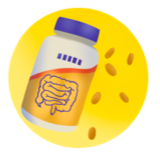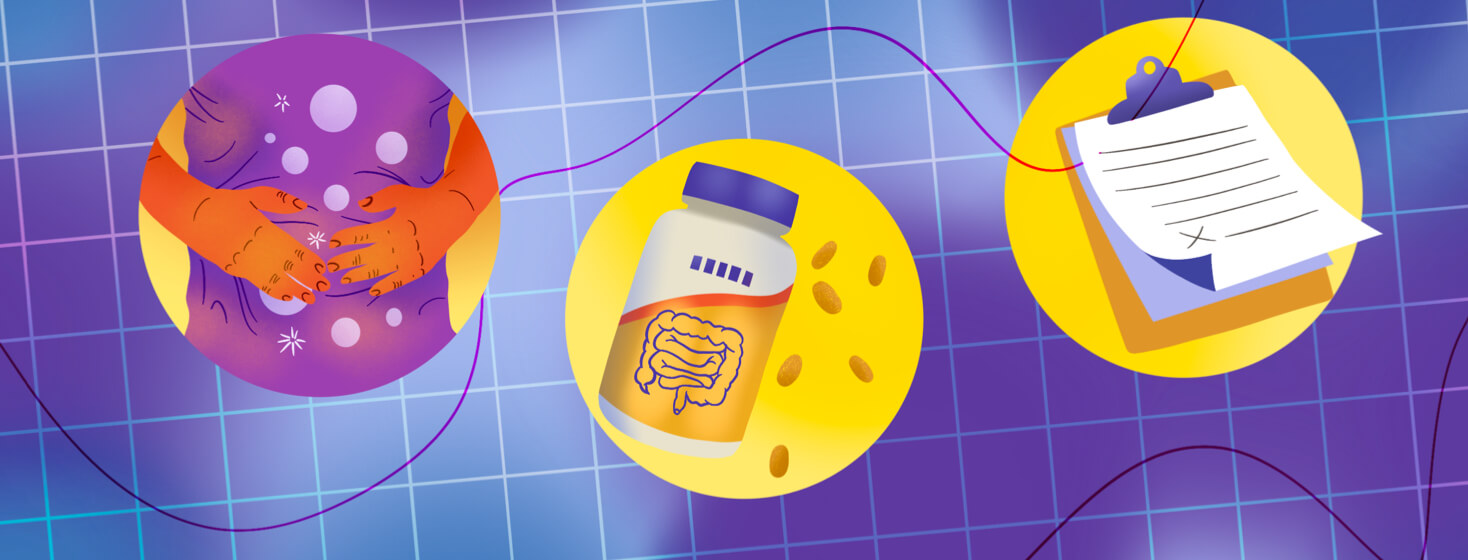People With IBS Report Symptoms Despite New Treatments
We recently conducted the 2022 Irritable Bowel Syndrome In America Survey. The survey included 64 questions, and several focused on experiences with symptoms and treatments. One interesting finding was that while many new treatments exist for IBS, only a small proportion of people use them.
Reactions when IBS symptoms first appeared
When IBS symptoms arise, many do not realize a serious disease may be causing them. The survey asked participants how they first responded to their IBS symptoms. About half tried OTC drugs or ignored symptoms. Other responses included:
- Seeking medical care as soon as possible (29 percent)
- Not thinking symptoms were serious enough for medical care (23 percent)
- Not thinking symptoms were from a medical condition (22 percent)
- Thinking symptoms were from a different, existing medical condition (18 percent)
Symptoms experienced during IBS episodes
 IBS episodes, or flare-ups, can lead to many painful symptoms. Around three-quarters of respondents named abdominal cramps and pain as symptoms they have during a flare-up. Other common symptoms included:
IBS episodes, or flare-ups, can lead to many painful symptoms. Around three-quarters of respondents named abdominal cramps and pain as symptoms they have during a flare-up. Other common symptoms included:
- Bowel urgency (71 percent)
- Frequent bowel movements (66 percent)
- Bloating (65 percent)
- Excessive gas/flatulence (64 percent)
- Full feeling in their abdomen (62 percent)
- Fatigue (60 percent)
- Chronic or persistent diarrhea and constipation (49 percent)
Frequency of IBS episodes
The frequency of IBS flare-ups varies from person to person. To better understand trends, we asked how often respondents had experienced IBS symptoms in the last year. Slightly more than 40 percent experienced weekly symptoms, and slightly less than 40 percent experienced daily symptoms. Less common responses were:
- Monthly (14 percent)
- Every few months (6 percent)
- Once every 6 or more months (2 percent)
Choosing an IBS treatment
 Many factors go into choosing how to treat IBS. In the survey, we asked participants to rate their specific concerns about available treatments.
Many factors go into choosing how to treat IBS. In the survey, we asked participants to rate their specific concerns about available treatments.
The large majority of respondents (89 percent) rated the effectiveness of a treatment as extremely important to them. A similar number (81 percent) consider the potential side effects of treatment extremely important.
The other common factors that were important to treatment choice included:
- Affordability/cost of treatment (65 percent)
- Doctor’s recommendation (62 percent)
- How easy or convenient it is to take (60 percent)
- The way the treatment is taken (49 percent)
Only 40 percent found reviews from others who had used the treatment helpful.
Prescription drug use and satisfaction
Most survey respondents are not using a prescription drug for IBS. The survey listed 8 IBS drugs, and only 10 percent of respondents actively used one. Around a quarter had used one of the drugs in the past.
Less than half of respondents are fully satisfied with the drug they are taking to treat their IBS. However, less than half are likely to discuss switching to another drug with their doctor.
Other treatments for IBS
 We also wanted to learn more about how people use digestive enzymes and digital therapeutic treatments to manage their IBS.
We also wanted to learn more about how people use digestive enzymes and digital therapeutic treatments to manage their IBS.
Digestive enzymes help break down food in the body. Some people do not produce enough natural digestive enzymes. Taking a digestive enzyme supplement helps their body process certain foods.1
- 16 percent of respondents are currently using a digestive enzyme.
- Another 12 percent have used a digestive enzyme in the past.
Digital therapeutics are a form of virtual therapy. They use cognitive behavioral therapy (CBT) methods to address the connection between the gut and the brain. Research shows that CBT can help ease IBS symptoms. And the risk for side effects with this treatment is low.2
However, this treatment has not yet been embraced on a large scale for IBS treatment:
- 0.3 percent of survey respondents currently use digital therapeutics.
- 1 percent have used this treatment in the past.
The 2022 Irritable Bowel Syndrome In America Survey was conducted online from May through July 2022. The survey was completed by 1,478 people.

Join the conversation